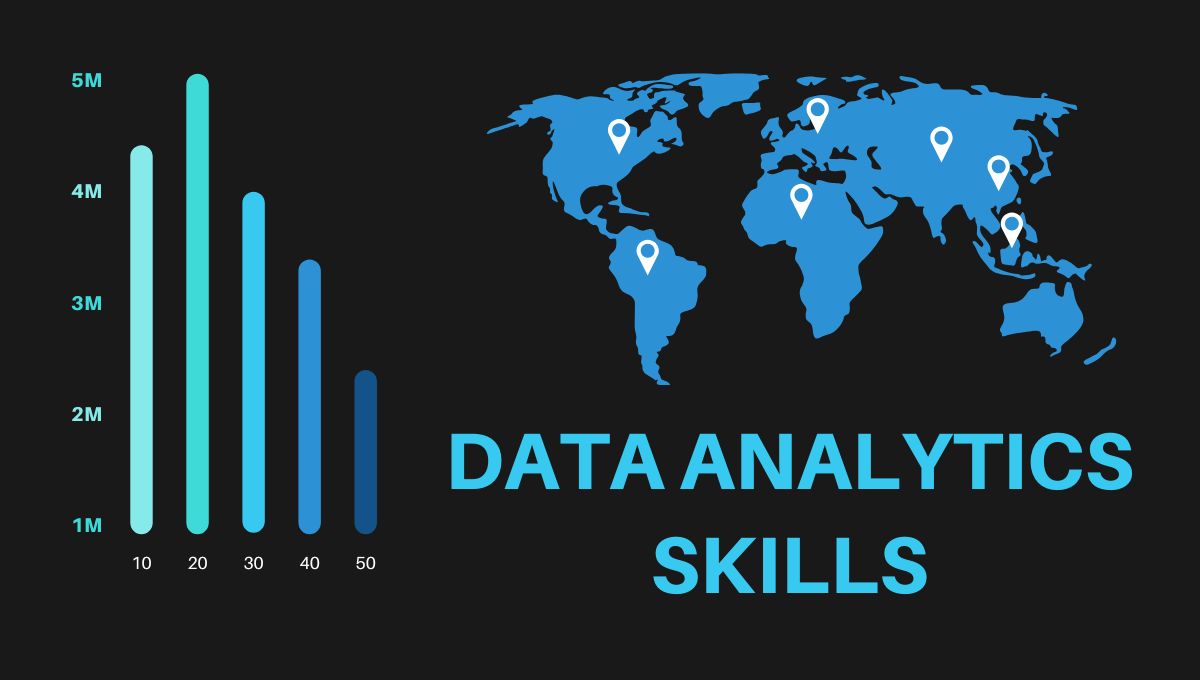In the current context of a blistering digital age, producing value from data is appreciated more than any time in human history. You? Whether newly graduated and walking into an industry or a skilled professional about to upskill, knowing the key data analytical skills will open doors to rewarding career paths. Ready to see how you can stand out in this competitive place? Let’s jump right in.
Why Data Analytics Skills Are Great for Career Growth
There surely are increasing demands all over industries for data-driven decision-making. Companies are leveraging data for better efficiency, understanding their customers, and driving innovation. The global big-data market was projected to be worth $103 billion by 2027 according to Forbes. And technical upgrade in any data analytical skills combined with basic digital competence will give you a head start over your contemporaries to keep or build up in a data-driven workplace.
Data Analytics Required Skills
Hard vs. Soft Skills: A Comparison
Understanding both technical (hard) and interpersonal (soft) skills is critical to becoming a well-rounded data analyst.
| Skill Type | Examples | Importance |
| Hard Skills | Programming, statistical analysis | Essential for technical tasks like data cleaning and modelling. |
| Hard Skills | Data visualization, database management | Critical for creating understandable insights and managing data efficiently. |
| Hard Skills | Machine learning, big data handling | Necessary for predictive analytics and processing large datasets. |
| Soft Skills | Communication, problem-solving | Vital for presenting findings and collaborating with teams. |
| Soft Skills | Time management, adaptability | Helps in meeting deadlines and adjusting to new tools or methods. |
| Soft Skills | Critical thinking, teamwork | Enhances decision-making and project outcomes through collaboration. |
Top Data Analytics Technical Skills
- Programming Languages
Knowledge of programming languages such as Python, R, and SQL is basic. For example, Python is mostly used for cleaning data and doing machine learning. Proficiency in these languages improves your productivity and employability.
- Data Visualization Tools
Data visualization such as Tableau and Power BI enables analysts to represent complex data in a digestible format. The ability to produce results using these tools is of great impact on the related decision-making processes.
- Statistical Analysis
Any background in statistics is quite mandatory. The depth and understanding in hypothesis testing, regression analysis, and probability allow for the interpretation and prediction of data trends.
- Data Cleaning and Preprocessing
This means getting raw data ready for analysis by addressing missing values, duplicate removal, and ensuring consistency. Data cleaning provides accuracy to the insights.
- Cloud Computing for Data Analytics
Scalable storage and scalable analysis using the cloud platform through AWS, Google Cloud, and Microsoft Azure has become common nowadays. Being well-versed in these adds considerable value to your technical kit.
- Machine Learning and AI
Machine learning and AI are transforming the way businesses operate. Such advanced data analytics skills give an opportunity to the analyst to develop prediction models and automate processes, making them very valuable. 7. Handling Big Data
Using tools like Apache Hadoop and Spark, big data handling is important for managing unstructured and semi-structured data.
Practical Steps to Develop Data Analytics Skills
Building a strong skill set requires continuous learning. Here are some practical steps:
- Enroll in a Data Analytics Course: Choose courses that cover both foundational and advanced topics. Coursera and edX are great options.
- Practice Real-World Projects: Apply your skills to real datasets to gain practical experience.
- Stay Updated: Follow blogs like KDnuggets to keep up with the latest trends in data analytics.
FAQs
What are the most important data analytics skills?
Programming, statistical analysis, and data visualization are some key skills. It helps in translating raw data into actionable insights.
How do I get started in data analytics?
Start with online courses and try practicing on real datasets. Coursera and Udemy are a good place to start with a beginner-friendly approach.
What role does machine learning play in data analytics?
Machine learning allows for predictive modeling and automation of analytical tasks. It helps in unpacking complex hidden patterns and deriving data-driven forecasts.
Is coding necessary in data analytics?
Indeed, coding is needed in various tasks, such as data cleaning and analysis. Python and SQL languages are very essential.
Which industries apply data analytics?
Healthcare and finance, retail, tech apply analytics for the betterment of their operations and order-making.
What tools are most commonly used in data analytics?
Tools like Tableau, Power BI, and Python are commonly used. They help in visualizing data, statistical analysis, and automation.
Can I learn data analytics without a technical background?
Yes, many beginner-friendly courses are available. With dedication, you can acquire the skills required to succeed in the field.
What are the career prospects in data analytics?
The high demand is seen in data analyst, data scientist, and business analyst. Salaries for these positions are quite attractive along with good opportunities for growth.
How many months will it take to become a data analyst?
Basic skills take about 6-8 months. More advanced skills would require extra time, which may depend on complexity.
What is the average salary of a data analyst?
Data Analyst Salary in India ₹4 LPA – ₹10 LPA
Average salary: ₹6 LPA (Glassdoor)
Salaries differ by experience, location, and industry
Key Takeaways
- For career development in a data-oriented world, data analytics skills matter a lot.
- Learning both technical and soft skills contributes to the very development of a person.
- Join these top data analytics courses for easier training.
- Keep yourself updated regarding the industry trends and tools.
Conclusion
In the time of data-driven decision-making, data analytics is now no longer seen as a supplementary option; it is a solid must for a marketer to retain competitiveness in the ever-expanding reach of the workforce. From hard skills like programming and machine learning to soft skills like communication and critical thinking, a well-rounded skillset will offer a gateway to infinite opportunities.
By constantly learning with reputable courses alongside practical experience, one can not just acquire proficiency but also competence and thereby assure a secure career within this constantly changing domain. Now that businesses are heavily dependent on data for innovation, it is right to equip oneself with skills and become an irreplaceable data analytics asset.
Start your journey today to receive the key to the power of transforming data into very concrete insights-altering futures.



